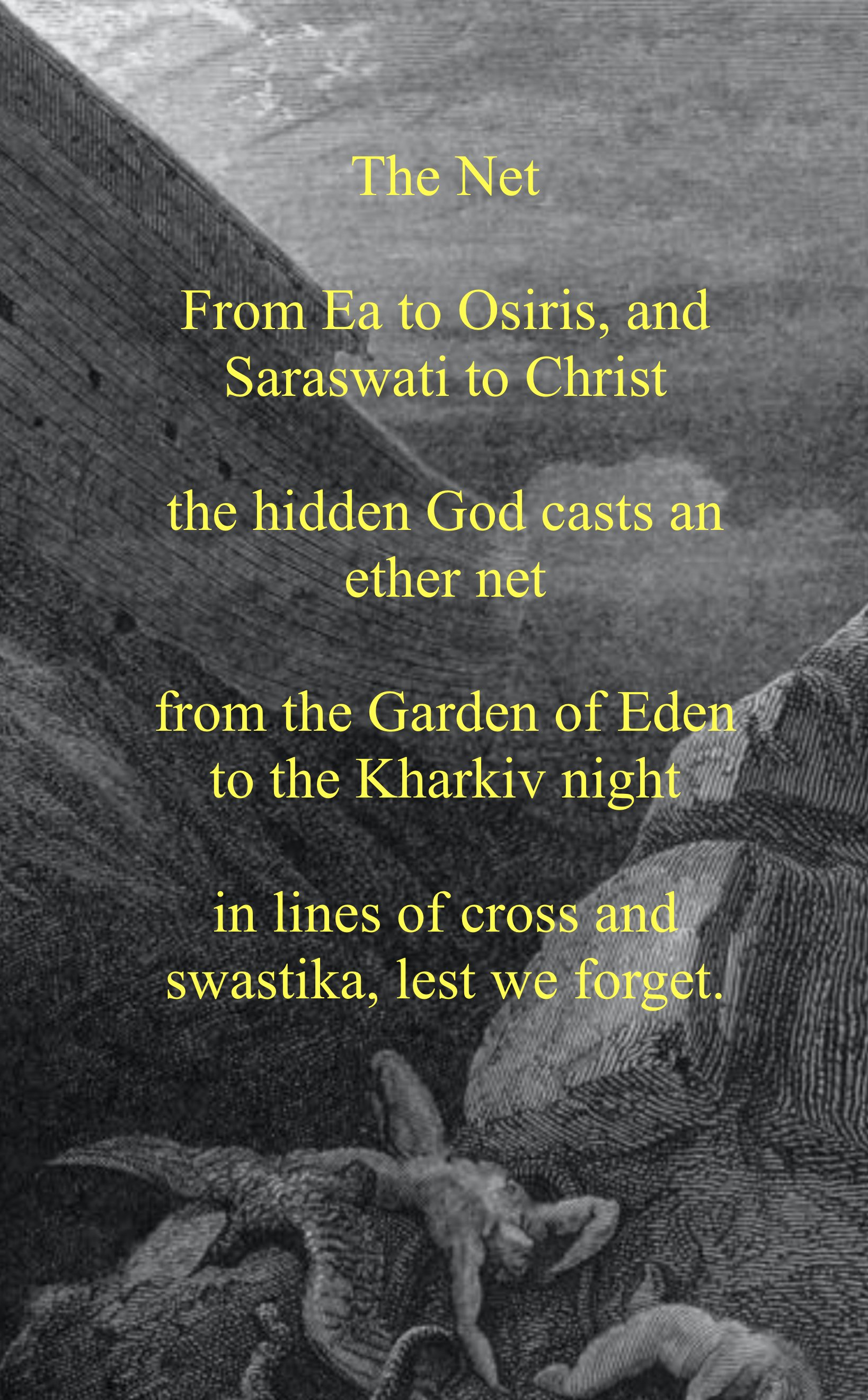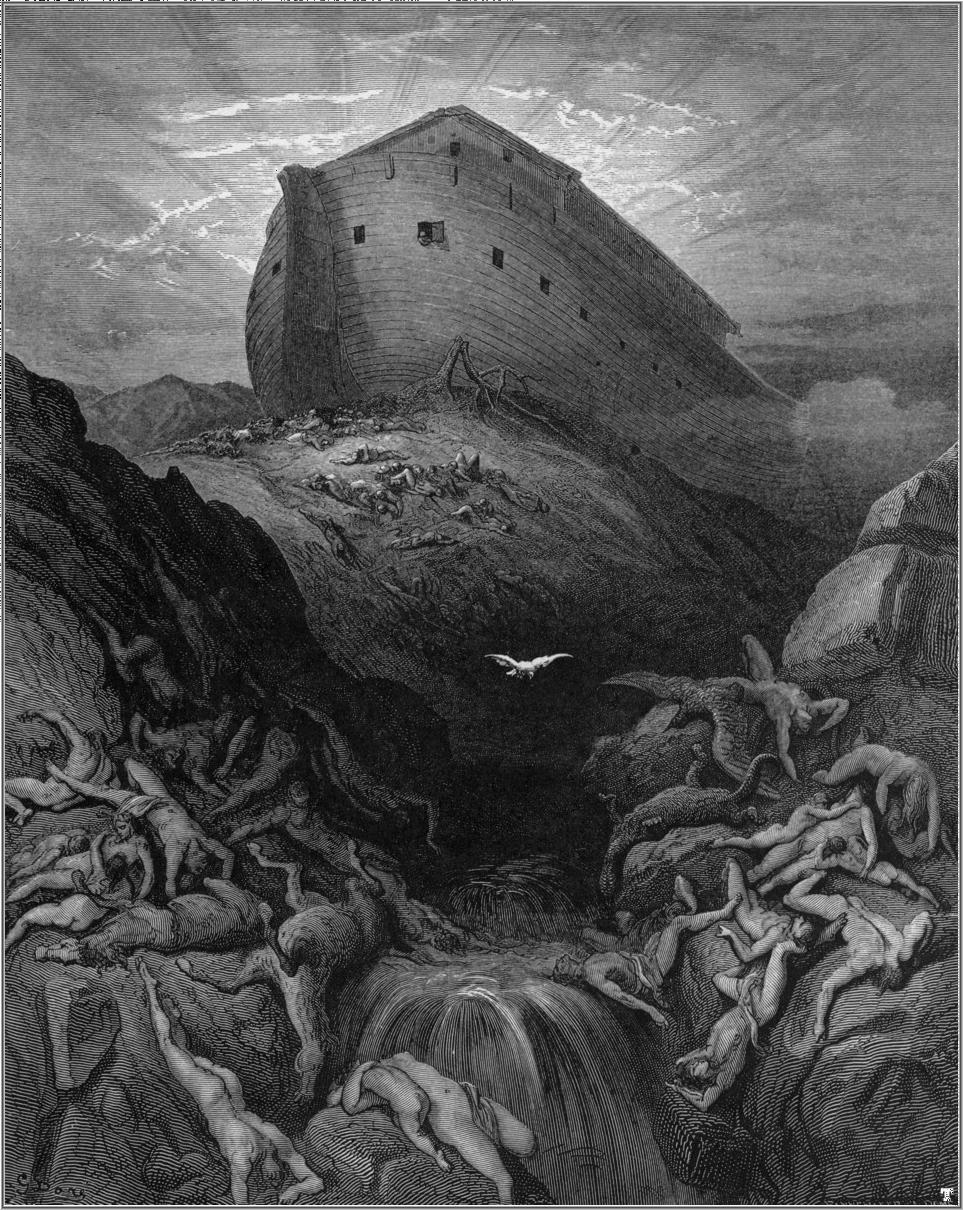The Double Refuge ♒️ The Currents of Sumer
Post & Other Scripts
Perhaps - The Net - An excerpt from Rivers of God
♒️
In the remaining two pages of The Currents of Sumer I conflate Mesopotamian, biblical, and other texts to highlight the precariousness of 1. our habitual state, forever prey to the brutality and beauty of the universe, and 2. our present political world, which has all the usual people at each others’ throats (grouped largely by nation, economics, political culture, ethnicity, language, and religion), as well as the less usual, more apocalyptic standoff of nuclear weapons at the ready. Yet there’s also the off-chance that a Force, call it Grace, Jesus, Ea, or Shamash, will surface to turn darkness into light.
♒️
Perhaps
Perhaps we can only see the Ultimate Power of the universe — whether this be God, Being, the Good, the Way, Brahman, Gods, Eternal Mystery, Nature, or Blind Chance — in terms of metaphors, conceits, and stories.
Perhaps we see everything through a veil of Illusion and this physical universe is itself Maya, Illusion, a metaphysical version of a fictional play:
Our revels now are ended. These our actors,
As I foretold you, were all spirits and
Are melted into air, into thin air:
And, like the baseless fabric of this vision,
The cloud-capp'd towers, the gorgeous palaces,
The solemn temples, the great globe itself,
Ye all which it inherit, shall dissolve
And, like this insubstantial pageant faded,
Leave not a rack behind. We are such stuff
As dreams are made on, and our little life
Is rounded with a sleep. (The Tempest 4.1)
Perhaps we see that “all our yesterdays have lighted fools / The way to dusty death,” and that
Life’s but a walking shadow, a poor player
That struts and frets his hour upon the stage
And then is heard no more. It is a tale
Told by an idiot, full of sound and fury,
Signifying nothing. (Macbeth 5.5)
Or perhaps all our sound and fury is recorded in another world, weighed like an Egyptian feather, so that our souls, if pure, will go to dwell among the Western Reeds — or, if impure will burn themselves out in flames;
perhaps “the next world might be located [❧] in the area around the tomb [❧] on the “perfect ways of the West,” [❧] among the stars or in the celestial regions with the sun god, [❧] in the underworld, the domain of Osiris, [ or ❧] in a marshy land of plenty.” (Encylopedia Britannica);
or perhaps all our words are judged by a Word that comes down to us from the mountain-top and etches itself onto two thousand tablets of clay or two tablets of stone;
or perhaps all our actions are minor details in a cosmic battle of Good versus Evil;
or perhaps all our predictions are superseded by a Fate that lies beyond the highest God;
or perhaps all our spirits are blown by Shelley’s “wild West Wind,” the “breath of Autumn's being, […] from whose unseen presence the leaves dead / Are driven, like ghosts from an enchanter fleeing, / Yellow, and black, and pale, and hectic red, / Pestilence-stricken multitudes” (“Ode to the West Wind”);
or perhaps “The net of heaven is cast wide. Though the mesh is not fine, yet nothing ever slips through” (Daode Jing 73);
or perhaps the ultimate Power in the universe is like a Net of ether that’s cast over the trillion skies, entangling the hope that we might move on from war to peace, from the battle of the city-states of Mesopotamia & the Trojan War, from Marcus Aurelius on the battle lines of the Danube, from the sacking of Nishapur & the slaughter of Bartholomew’s Day, from the Holodomor & the Holocaust, from the bombings of Nagasaki & Kharkiv, etc.
♒️
An Excerpt from Rivers of God (🇫🇷 The Priest’s Dilemma)
In one story Yahweh wanted to drown the world, but then he warned Noah. In another, Enlil wanted to drown the world, but then Ea warned Utnapishtim to build an ark. What did it matter who said what to who, as long as the Heavens relented?
What did it matter who was tested, Job or Gilgamesh, as long as at some point there was redemption? The one thing Jean-Luc held onto was that at some point cataclysm turned into salvation. At some point, water turned into wine. Long after the blood of the Sumerians mixed with that of the Akkadians, long after Abraham left the city of Ur. At some point, through the Egyptians or through existential despair, the flooding ceased, and the water turned to wine.
Jean-Luc held onto this hope like a wooden cross swept sideways in a flash-flood crashing through the Zagros foothills. He imagined that he was a friend of Noah's, but Noah hadn't mentioned anything about the weather. Or that he was a friend of Utnapishtim's, what did it matter?
A Dove Is Sent Forth from the Ark (Genesis 8:1-13), from Doré's English Bible (1866), by Gustave Doré. From Wikimedia Commons.
Jean-Luc felt the currents of the Ancient World every time he lifted the chalice and every time he placed the wafer on a tongue. He thought of the waters of the Euphrates — or the Jordan, or the Nile, or the Seine, what did it matter? — mixing with the wheat. The wheat that was the body, and the water that was the blood. The blood that was the wine.
♒️
Next: The Return of Enlil



